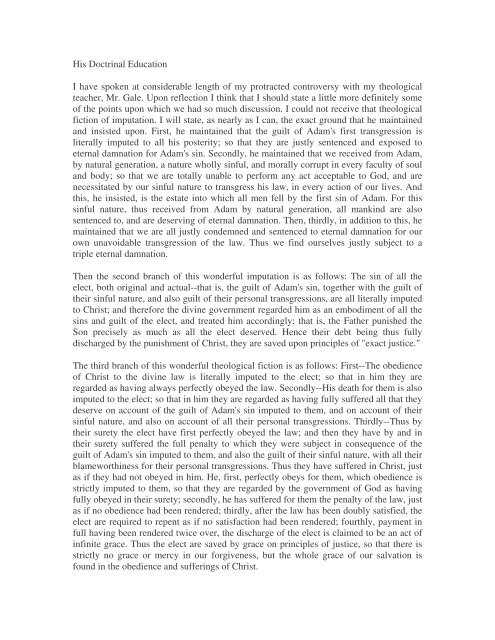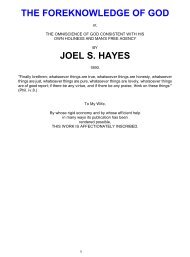Are Men Born Sinners? - Library of Theology
Are Men Born Sinners? - Library of Theology
Are Men Born Sinners? - Library of Theology
You also want an ePaper? Increase the reach of your titles
YUMPU automatically turns print PDFs into web optimized ePapers that Google loves.
His Doctrinal Education<br />
I have spoken at considerable length <strong>of</strong> my protracted controversy with my theological<br />
teacher, Mr. Gale. Upon reflection I think that I should state a little more definitely some<br />
<strong>of</strong> the points upon which we had so much discussion. I could not receive that theological<br />
fiction <strong>of</strong> imputation. I will state, as nearly as I can, the exact ground that he maintained<br />
and insisted upon. First, he maintained that the guilt <strong>of</strong> Adam's first transgression is<br />
literally imputed to all his posterity; so that they are justly sentenced and exposed to<br />
eternal damnation for Adam's sin. Secondly, he maintained that we received from Adam,<br />
by natural generation, a nature wholly sinful, and morally corrupt in every faculty <strong>of</strong> soul<br />
and body; so that we are totally unable to perform any act acceptable to God, and are<br />
necessitated by our sinful nature to transgress his law, in every action <strong>of</strong> our lives. And<br />
this, he insisted, is the estate into which all men fell by the first sin <strong>of</strong> Adam. For this<br />
sinful nature, thus received from Adam by natural generation, all mankind are also<br />
sentenced to, and are deserving <strong>of</strong> eternal damnation. Then, thirdly, in addition to this, he<br />
maintained that we are all justly condemned and sentenced to eternal damnation for our<br />
own unavoidable transgression <strong>of</strong> the law. Thus we find ourselves justly subject to a<br />
triple eternal damnation.<br />
Then the second branch <strong>of</strong> this wonderful imputation is as follows: The sin <strong>of</strong> all the<br />
elect, both original and actual--that is, the guilt <strong>of</strong> Adam's sin, together with the guilt <strong>of</strong><br />
their sinful nature, and also guilt <strong>of</strong> their personal transgressions, are all literally imputed<br />
to Christ; and therefore the divine government regarded him as an embodiment <strong>of</strong> all the<br />
sins and guilt <strong>of</strong> the elect, and treated him accordingly; that is, the Father punished the<br />
Son precisely as much as all the elect deserved. Hence their debt being thus fully<br />
discharged by the punishment <strong>of</strong> Christ, they are saved upon principles <strong>of</strong> "exact justice."<br />
The third branch <strong>of</strong> this wonderful theological fiction is as follows: First--The obedience<br />
<strong>of</strong> Christ to the divine law is literally imputed to the elect; so that in him they are<br />
regarded as having always perfectly obeyed the law. Secondly--His death for them is also<br />
imputed to the elect; so that in him they are regarded as having fully suffered all that they<br />
deserve on account <strong>of</strong> the guilt <strong>of</strong> Adam's sin imputed to them, and on account <strong>of</strong> their<br />
sinful nature, and also on account <strong>of</strong> all their personal transgressions. Thirdly--Thus by<br />
their surety the elect have first perfectly obeyed the law; and then they have by and in<br />
their surety suffered the full penalty to which they were subject in consequence <strong>of</strong> the<br />
guilt <strong>of</strong> Adam's sin imputed to them, and also the guilt <strong>of</strong> their sinful nature, with all their<br />
blameworthiness for their personal transgressions. Thus they have suffered in Christ, just<br />
as if they had not obeyed in him. He, first, perfectly obeys for them, which obedience is<br />
strictly imputed to them, so that they are regarded by the government <strong>of</strong> God as having<br />
fully obeyed in their surety; secondly, he has suffered for them the penalty <strong>of</strong> the law, just<br />
as if no obedience had been rendered; thirdly, after the law has been doubly satisfied, the<br />
elect are required to repent as if no satisfaction had been rendered; fourthly, payment in<br />
full having been rendered twice over, the discharge <strong>of</strong> the elect is claimed to be an act <strong>of</strong><br />
infinite grace. Thus the elect are saved by grace on principles <strong>of</strong> justice, so that there is<br />
strictly no grace or mercy in our forgiveness, but the whole grace <strong>of</strong> our salvation is<br />
found in the obedience and sufferings <strong>of</strong> Christ.






